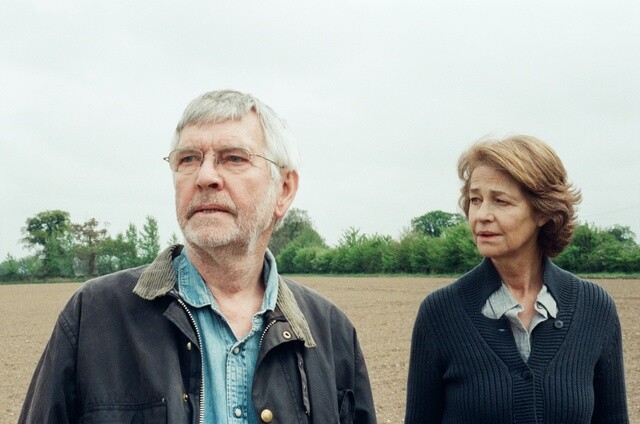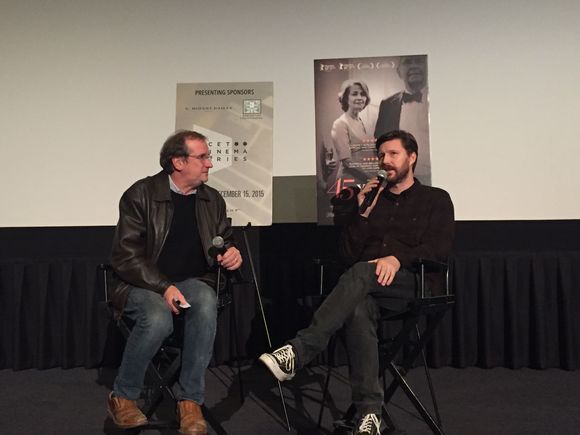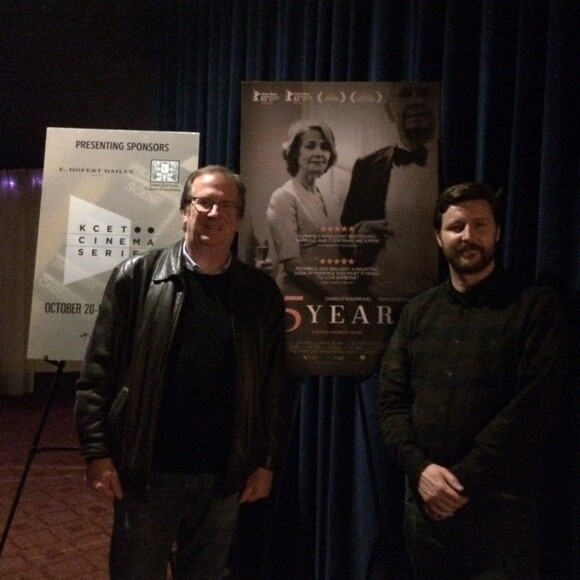45 Years: Director Andrew Haigh on Reconciling the Past

On Tuesday night, KCET Cinema Series members got to check out a pre-release screening of the latest film from British screenwriter/director Andrew Haigh. "45 Years" is based on David Constantine's short story "In Another Country" and stars Charlotte Rampling and Tom Courtenay as a couple whose marriage is tested in the days leading up to their 45th anniversary party. "45 Years" opens in theaters on December 23.
The film has already made a splash with critics, particularly for Rampling's portrayal of a wife who now questions her marriage and life. Rampling recently won a Best Actress award from L.A. Film Critics Association, as well as an award from the Boston Society of Film Critics.
KCET Cinema Series is sponsored by the E. Hofert Dailey Trust and James and Paula Coburn Foundation and gives attendees a chance to see acclaimed films before they open to the general public. The winter session of the series has featured screenings of "Spotlight," "Carol," "The Danish Girl" and other hotly anticipated films. Next week, the winter series closes with a James Coburn film, "What Did You Do in the War, Daddy?"
For this screening of "45 Years," KCET Cinema Series host and Deadline columnist Pete Hammond sat down for a Q/A with Andrew Haigh, highlights of which appear in this article.
On the source material.
It was based on a short story called "In Another Country" and I was sent it while I was editing "Weekend," it was around that time. I got sent the short story and it was very short. It's like 12 pages. It has the central kind of idea of this body being found and the effect of the past on this present relationship, but it was very much told from the male perspective and I kind of changed that around, clearly, and turned it into being from the female perspective and just widened up, enabling it to be kind of a movie, but it was a very short story.
On telling "45 Years" from the perspective of the female character.
Weirdly, it felt very natural. I don't know what that says about me. It felt like a more interesting way to tell the story. I think there have been a lot of films about the male existential crisis, the later middle age existential crisis.
I couldn't really think of one that was, felt like it was from a woman's perspective, as if they don't have them, which I'm sure everybody does have them or can have them. It just made sense to me and I loved the idea that it was the effect of this thing that hadn't actually happened to her. It was something to the husband that started to unravel her understanding of herself and the relationship she was in.
On the similarities between "45 Years" and ghost stories.
I really saw it as a ghost story, essentially. I think our pasts, they are just the ghosts that hang around every corner. I did feel that it was almost like a haunted house film, just without the traditional ghost. I did like the fact that slowly, she's trying so hard to be strong and deal with this because she knows that it's something that doesn't really exist. It's something that happened in the past. It's something that happened in the past. It shouldn't affect her, but it does. It makes her question everything and I find that to be a really fascinating thing. I think once we start to focus in our lives, they can very quickly unravel.
On the film's sex scene.
You rarely see sex scenes with older people.
It was weird to me that you don't see that. To me, sex in a relationship is about reconnection. It's not just about the act of sex. It's about your partner realizing that they still want to be with you and you wanting to be with each other. For me, it's a sad moment. In many ways, if they had managed to reconnect in that moment, they might have been able to open up more about how they were feeling.
I think it's very easy when things just constantly don't quite work out how you want them too. You just get more and more thrown off balance.
On the choice of location for "45 Years."
We shot it in Norfolk. I don't know if anybody knows where that is. It's a very beautiful, but slightly strange, part of the east of England. It's more like Holland, I think, than anything else. It's very flat. I lived there for a while. There's just something about it. The original story was set in Wales, which is mountainous, but I loved the idea that the presence of the story is very flat, there's nothing but endless horizon and your death at the end of it. The story in the past, there's peaks and mountains and passion and kind of excitement. I think all of our lives reach a kind of plateau and they kind of amble along, which is nice, can be nice, is nice. Then this comes up and throws it off.
It's a strange area. I think it really speaks to an English melancholy that I think is deeply rooted in the English psyche and I thought that landscape kind of accentuates that kind of melancholy.

On Kate and Jeff's lack of communication and Kate's revelations.
I think there are a lot of things. I think we are more reserved, or maybe the older generation in England is more reserved and the younger generation is different. Also, I think that, when you're in a relationship, the longer you're with them, it gets harder to talk about certain things. There's almost more to risk and there's more at stake. You don't want to hurt the person that you're with. You don't want to bring something up that you think is going to upset them because you genuinely care for them and love them. I also think what's happening is that there are things we can articulate, which is like the top level of our feelings, but then there's this deep, dark pain that I think so many of us carry around that we can't articulate because we actually don't understand it. It's just kind of there. I think with for difficult for her to kind of express.
I think even when you have an idea of what something is and then you suddenly think, oh, it's not that, I think it can change everything. It can change not only the understanding of your relationship, but also of you. I also think for Kate, there's an important moment when she realizes that he would have married this woman. If she hadn't died, they would have lived a life. And, what would her life had become then? Where would she have lived? Who would she have met? Would she have had children? I think when we start to look too much at the possible choices and turns in our lives that we could have made, I think it can make you feel very disconcerted.
On casting Charlotte Rampling and Tom Courtenay.
It's very scary getting that cast because you obviously also want to get it right. We finished the script. We got some funding before we had the cast, which was good, and then I basically sent it to Charlotte. I basically wanted to cast a female lead first before we would even think about who would be partnered with her, so I sent it to Charlotte with basically a begging letter and a copy of my previous film. I didn't hear anything for a little bit, then she called me up. I was in L.A. editing and she said, "It's Charlotte Rampling here." I was like, Oh God. We just talked for a half an hour about the project and what she thought it was about and what I thought it was about. She had watched my film and liked it. She was like, "Yep, I'd love to do it."And it was kind of as simple as that.
And then, very quickly after that, we sent it to Tom. Again, he didn't watch my previous film. He still hasn't watched it. He says, "I tried to watch it, but it was mumbling too much, so I couldn't understand what they were saying." Fair enough. I'm just glad he said yes to doing it.
On the chemistry between Charlotte Rampling and Tom Courtenay.
We didn't rehearse or anything. Charlotte hates to rehearse, so you just don't rehearse. I don't really like it either. It's not a thing that I like to do. So they spent a morning together, that was it. I spent time with both of them individually talking about things, but they spent one morning together, read the script, had a coffee and then we were shooting. I think chemistry is something that you create in the moment through lots of different ways, but also, they're good actors. They have to look like they like each other, so you find ways to make that believable and they're professionals, so they know what they're doing.
On the music in "45 Years."
The music is all pretty much all scripted, all of those songs were in the script. I spent a lot of time in my bedroom listening to old '60s music. I found it, in a film where there are no flashbacks, I felt like the music almost acted as flashbacks. You could imagine them, Jeff and Kate, when they were younger, listening to that music and loving those songs, so it became a sort of key part of the film. Obviously, she has to choose the songs for her wedding. The final song, almost before I started writing the script, I thought of that song. It was very very early on and I love the way, the lyrics are actually really, really depressing, but it has a feeling of love strangely. I love that that the song, when they got married, would have meant one thing and 45 years later, the same song suddenly feels very, very different in that final moment.
It was actually relatively straightforward [to clear the songs]. I think when your budget is relatively small, which ours was, and the music companies know that it's small, they don't ask for a huge amount of money. So, it didn't eat up a huge amount of our budget, which was good. As you say, we didn't have the Beatles or the Stones, so it ended up being manageable.

On writing older characters.
In a weird way, I felt like I put myself into both of their skins and I feel like, if I were their age, I would act the same way. I feel like, when I was writing, I didn't think about it. I didn't think about what is like to be 70. We all have, I'm 43 and I have regrets and fears and I have things that I know could have turned out differently for me. I have all of those things. I'm in a longterm relationship, I know what that feels like. I'm pretty sure that you don't change in life as much as you think you do and your core being probably gets set early on. I feel like who I am at 20 is quite similar to 30, 40, will be when I'm 50, 60, 70. It just made sense to me that I made sure that these characters felt like they were still actively asking questions and they weren't the cliched version of an old person that you see in movies, which is kind of doddering around and making bad jokes. I felt like I had to make it feel like they could be any age. But, then you get someone like Tom and Charlotte to play it and they bring that final bit to life.
On the different reactions from men and women in audiences for "45 Years."
There's definitely a difference. I think more men were like, "I don't know what she's worried about. She should forgive him. It's fine. Get over it. Stop worrying about it." And more women were like, "Excuse me?" I had a screening in London and I came out and my aunt and uncle didn't see me, but I was standing near them. They were fighting about it. He was like, "She should just get over it." She was like, "How dare you say that!" That was good. They might get divorced after that.
Of course, there were men who completely understood her feelings. There were women who were on his side, not her side. It's very much down to your own feelings and probably your own lives and your own history and how you read it. For me, the more important thing is to make it complicated enough and messy enough that there's no right and wrong. It's not one person is right and one person is wrong. These are two people struggling with their feelings. Even if they aren't, intellectually, the feelings that they should be having, they are feeling them and they can't help themselves.
On the sound design.
The sound was so important to me. There's no traditional score, it's just songs that you hear kind of played. The sound design is so important. I'm just obsessed with sound, how it can make you feel and how it can get inside someone's head in a really, really subtle way. We had a great sound designer, Joakim Sundstrom, who has worked on a lot of British films and is really talented, and he really finds that nuance so that it's very expressive without being too heightened. But, at the right times, you really start to feel it.
I think we spent so long doing strange things, like having sounds that would begin at the beginning of the film and then we would repeat them later on-- not just the slide projector, but certain winds and creeks. It's all very background, subconscious stuff. Wherever we could have something that comes in the beginning and then is repeated at the end made sense to me in terms of, thematically, something appearing in the past and coming into the presence. So, we really spent a lot of time getting that sound right.


